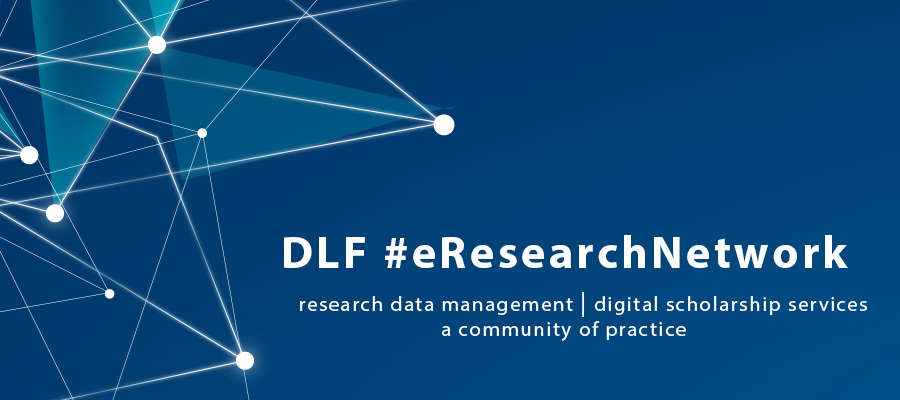
About eRN:
The DLF eResearch Network brings together professionals from research-supporting libraries to strengthen and advance their data services and digital scholarship roles within their organizations.
New in 2020:
eRN has merged with DLF’s Digital Scholarship working group! Stay tuned for updates coming this Fall 2020.
The core of the network is a working curriculum that guides participants through 6 monthly webinars that address current topics and strategic methods for supporting and facilitating data services and digital scholarship locally. The webinars are designed around registrant needs and feature guest speakers, activities, and small-group discussions. Monthly assignments provide structure for each team to build skills and programs at their institution. The eResearch Network (eRN) culminates in an individualized consultation during which the participating teams produce strategic agendas and working items for data services and digital scholarship support at their institutions.
2018 was the fifth year of the DLF eRN, which is itself a spin-off of an earlier ARL/DLF/Duraspace E-Science Institute. Past cohorts are listed in the sidebar.
Have questions for faculty or staff? Check the FAQ, or email bquon[at]clir.org.
Program Details
Facilitating the Experience
- Lectures, guest presentations, and small group discussions
- Practical assignments based on monthly webinar topics
- Slack channel and email list for between-session discussion and peer/alumni connections
- Regular, facilitated Slack chats for eResearch Network participants and alumni
- Shared documents at our OSF instance
- In-person networking meetings at the DLF Forum (optional)
Overall Goals for the Network
The goal of the DLF eResearch Network is to advance research libraries’ capacity to support data management and digital scholarship by:
- Promoting program development among DLF members
- Enabling development of a community of professionals engaged in data services and digital scholarship support
- Fostering collaboration between participant institutions (past and present) and DLF members at large
Outcomes for Participating Institutions
- Build skills that will enhance local data services and digital scholarship support
- Develop a local strategic agenda for data services and digital scholarship support that is action-oriented and based in practice.
- Work on a consultation project that enables a deep dive into a local initiative or pressing question related to data services or digital scholarship.
- Connect with a community of practice engaged in program planning and deployment of data services and digital scholarship.
Tuition + Enrollment
Past versions of the eResearch Network were tuition-based. The model is changing in 2019! Check back soon for more details.
eRN Alumni Accomplishments
Montana State University Library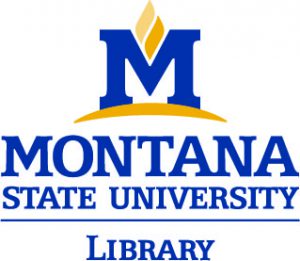
- Updated IR to accommodate data (DSpace 4)
- Partnership with ScholComm librarian
- Joint liaisonship to VP of Research
- Open Access Week
- Faculty meeting visits
- Two presentations for grad students and for grant-writers
- Campus data survey
- Data management webpage
Being a part of the DLF eResearch Network:
…has been a catalyst for new ideas. We especially liked hearing about strategies that have worked for other institutions.
University of Manitoba Libraries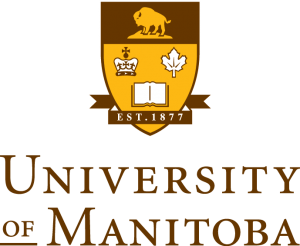
- Involved in the pilot of a secure file-sharing system (infrastructure)
- Participated in the launch of a data management consultation group (infrastructure, policy)
- Piloted the NECDMC curriculum (education/staff training)
Northwestern University Library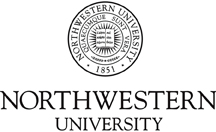
- Completed survey of electronic data management practices
- Began analysis of Northwestern’s NSF data management plans
- Participated in a project to build a data sharing platform for researchers involved in childhood development and health outcomes
- Presented at university research meetings, student orientations and begun planning workshops on data management practices
- Engaged the Office for Research and Core Facilities in discussions about drafting data use policies
- Working to develop more workshops, online training modules and resources
Resources presented by group members in previous discussions will prove immensely helpful in our development of our own training materials.
University of Toronto Libraries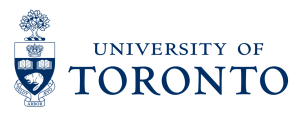
- Solidified membership of Research Data Working Group (RDM)
- Redefined the scope of RDM: now have a formal channel and defined tasks to achieve broader goals
The eResearch Network:
- Has helped continue those conversations outside the current topics of internal focus
- Provided insight into activities, services and infrastructure at other institutions
- Helps generate ideas, guide our approach, and learn from feedback of other institutional approaches
